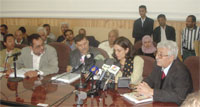
The concept of the ruler in the folklore legacy [Archives:2006/1002/Culture]
November 27 2006
 |
[email protected]
Ebtehal AlAghbay
[email protected]
“To comprehend the concept of the ruler in the folklore, we have to know the ruler's concepts and symbols manifested in the proverbs, fables, tales and folkloric expressions and believes,” said Arwa Othman, the director of Folklore House.
The two-day symposium on the “Concept of the ruler in the folklore” was launched Nov. 19 in the Studies and Research centre to discuss the research papers. It set up by the Friedrich Ebert Stiftung Foundation, a German organization managing numerous projects and programs inside and outside Germany in several fields such as the politics, international co-operation, scientific research, social development, and social equality.
The symposium aimed to dig up the relationship between these two forces; ruler and citizen, responsible man and subject, father and son, man and woman, as well as the core of folklore culture and the successive and hierarchy theories that illustrate figures in the folkloric mind.
Participated researchers recommended at the end of the symposium to establish an official centre interested in collecting, documenting and archiving verbal folklore and to bring together heritage material from all Yemeni regions.
From the symposium research papers
Beginning with Abdul Qareem Qasim who introduced his research entitled, “The country in the Yemeni folkloric proverbs.” He said fables, tales and proverbs are one of the most powerful folkloric arts that affectively shape our thoughts and concepts.
“The rulers and the opponents use fables, tales and proverbs as a sword for their individual interests. In the contrary, subjects and citizens found them an outlet to express the oppression and persecution they live in. The folkloric proverbs, however, were out of the ruler's influence because they are short and plain linguistic expressions can be easily memorized and circulated. What made proverbs more expressive to the citizens' feelings and thoughts and the simplicity of creating them, aside from the poems and the prose that need more talented people,” Qasim added.
At the end on the country policy Qasim wondered why the masters always forget to deal with people with justice in comparison to the rules. The real effective way to keep adopted rules going on systematically is achieved through oppression.
The same topic is dealt with in the book “The dominator's image in the folkloric songs” by Huda Alatas. She presents poetry complaining about the unfair dominators.
For the same purpose Abdulqadeer Alshaibani comments on Huda's book presenting more lines taken from Yemeni poetry with men praying to Allah to end their suffering their ruler cause them including their soldiers and followers.
A different topic is discussed in \”Heem Altegan


